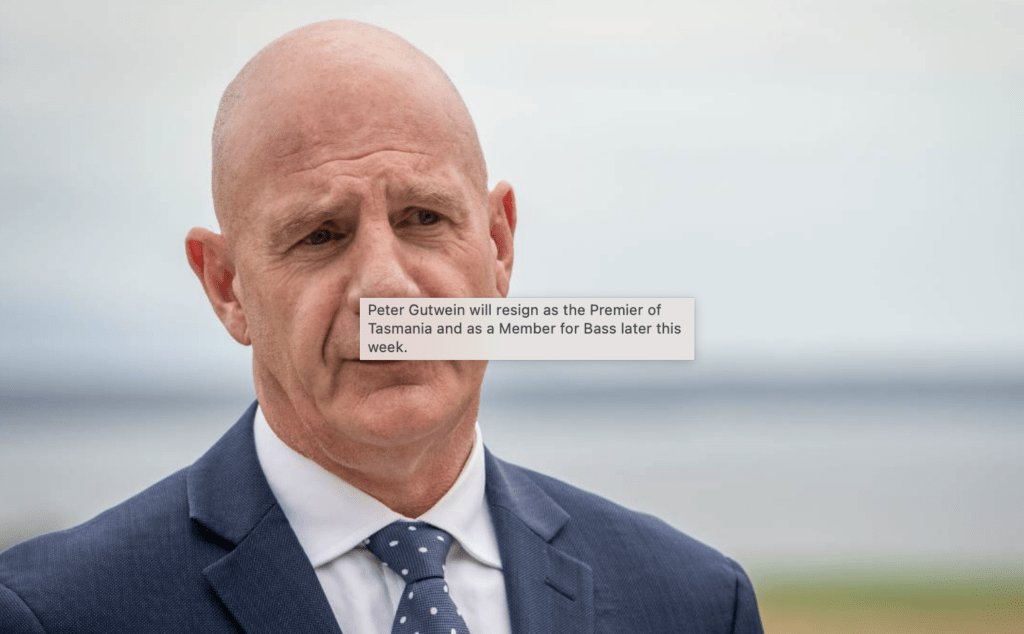Tasmanian Premier Peter Gutwein shocked everyone when he announced he’d be resigning from politics, saying he can “no longer give 110 per cent”.
At a press conference in Launceston on Monday, Gutwein said: “I’ve focused on everyone else’s family, I now want to spend some time focusing on my own.”
“It is with some sadness that I leave, but I know the foundations that have been laid, the path has been laid out that a new leader will be able to make their own, and importantly, make their own decisions moving forward,” he said.
The Liberal Party are now in the midst of selecting a new Premier to take over, with Gutwein confirming he’ll stay on until the decision has been made.
Gutwein likewise admitted that leading through COVID had taken its toll. “What I’ve found after the last two years especially is I have nothing left in the tank to give,” he said. He added that despite his family’s support, “that period through Christmas completely drained me”.
What struck me while watching Gutwein’s press conference, and far outweighed my surprise at his actual resignation, was his transparency in noting why he could no longer fulfil the role– that the immense pressure of trying to keep up as a father, a husband, and a leader was all too much.
While women concede this point regularly, it’s still rare for us to see high-profile men doing the same.
For too long a status quo has been upheld in Australian society in which women most commonly forsake their aspirations at work to take on the role of caregiver should they decide to have children, while men continue on an upwards career trajectory to provide financially for their families.
Our national policies still support this archaic “way of life”. Our paid parental leave system for instance is dismal; offering just 18 weeks minimum wage currently to a primary caregiver and 2 weeks to “dads and partners”.
While the Treasurer Josh Frydenberg announced in last week’s budget a potential change to the policy should the Coalition retain power in May, their tinkering could serve to be more detrimental than it is now.
20 weeks PPL will be allocated to a couple to take how they wish. But without a “use it or lose it” incentive in place for men, the take up will likely remain low, with global and Australian research indicating men are most likely to take parental leave when it is at income replacement level. Current cost of living pressures mean households are under increased economic strain and unable to afford any drop in income.
Meanwhile, childcare remains hugely cost prohibitive in Australia and is in fact one of the most expensive systems in the OECD region. Some centres in metropolitan areas now cost families upwards of $160 a day.
A Mitchell Institute report last year, showed that childcare is unaffordable for almost 40 percent of Australian families, with accessibility issues also mounting in regional and remote areas especially.
What our government fails to recognise, even as its own ministers and leaders fall by the wayside, is that two years living through a pandemic has shifted things irreversibly for Australian families. Up till now, an admission of burnout and discontentment like the one Peter Gutwein made yesterday would be rare in the extreme for men in his position to make. Most would continue to weather the storm, at the expense of their own mental wellbeing and that of their loved ones.
But if the last two years have served no other purpose, they’ve enabled us all to reflect deeply on the kind of life we genuinely want to live and what we deserve. And, in good news for the government, there are ways for us to achieve this balance while still contributing fruitfully to a flourishing economy.
If long-term measures supporting true reform like healthy, gender-equal paid parental leave and universal childcare were committed to, The Great Resignation would become The Great Opportunity.
If not? The government might find itself on increasingly rocky terrain, with families no longer happy and willing to give up certain critical aspects of their lives and livelihoods.


